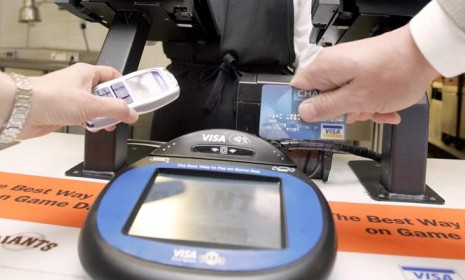Will customers embrace 'digital wallets'?
AT&T, T-Mobile, and Verizon are betting on technology that will let customers use their cellphones to pay for purchases. But are shoppers ready to ditch their credit cards?

A free daily email with the biggest news stories of the day – and the best features from TheWeek.com
You are now subscribed
Your newsletter sign-up was successful
While a good chunk of the tech world was focusing on Apple's yawner of an announcement about the Beatles on iTunes on Tuesday, there was a "much bigger technology story" brewing, says Patrick Hope at San Francisco Business Times. Three of the four biggest cellphone companies announced they would come together to form a "mobile payment network called Isis that would allow users to turn their phones into digital wallets that could be used to pay for groceries and other purchases. Japan and Finland have been using phones this way for years. Is the U.S. ready to catch up?
How does it work?
The phone companies signed on to use NFC (Near Field Communications), a wireless communication technology that will enable a cellphone to talk to a credit-card processing machine up to 4 inches away. Rather than "fumbling for a credit card," customers could instead pull out their cellphone to pay for an item; stores can deliver coupons straight to those phones in return.
The Week
Escape your echo chamber. Get the facts behind the news, plus analysis from multiple perspectives.

Sign up for The Week's Free Newsletters
From our morning news briefing to a weekly Good News Newsletter, get the best of The Week delivered directly to your inbox.
From our morning news briefing to a weekly Good News Newsletter, get the best of The Week delivered directly to your inbox.
Are there security concerns?
Michael Abbott, the CEO of Isis, says that security would be tighter with cellphones than it is with credit cards, since customer data would be locked and password-protected inside the phone. But Sascha Segan at PC World says that hackers could still install malicious software on smartphones to get around phone-based security." In other words, the jury's still out.
Will this really catch on?
The technology necessary for mobile-phone payments has been around since 2003, but the idea is gaining more momentum now than ever before, primarily because more companies and industries are embracing it. The day before the Isis announcement, Eric Schmidt, Google's CEO, revealed a prototype phone that had NFC technology built in; that phone will hit shelves in the coming months. With Isis expected to roll out to key geographic markets in the next 18 months, the stars may finally be aligning to make cellphone credit cards a reality.
A free daily email with the biggest news stories of the day – and the best features from TheWeek.com
Sources: San Francisco Business Times, CNET, PC World
-
 6 of the world’s most accessible destinations
6 of the world’s most accessible destinationsThe Week Recommends Experience all of Berlin, Singapore and Sydney
-
 How the FCC’s ‘equal time’ rule works
How the FCC’s ‘equal time’ rule worksIn the Spotlight The law is at the heart of the Colbert-CBS conflict
-
 What is the endgame in the DHS shutdown?
What is the endgame in the DHS shutdown?Today’s Big Question Democrats want to rein in ICE’s immigration crackdown